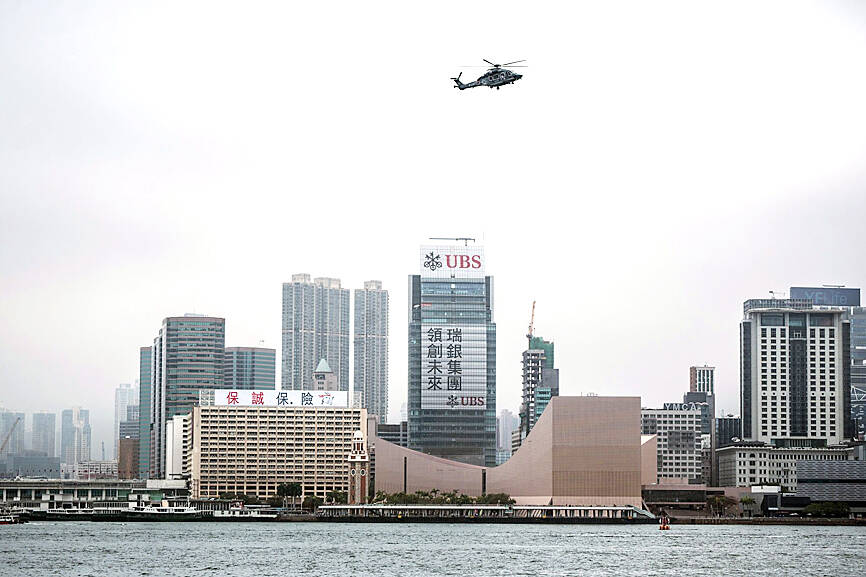Mainland Chinese companies are pushing up demand for upscale shared office space in Hong Kong’s central business district.
The Executive Centre, the biggest flexible workspace landlord in the district’s grade-A buildings, last month saw a fivefold increase in new leases from January.
About 70 percent of the new tenants were Chinese companies, it said.

Photo: Bloomberg
The removal of COVID-19 pandemic restrictions in China has led to an increase of client interest in the territory.
“During COVID, the businesses in mainland China had time to reflect and organize themselves,” Executive Centre CEO Paul Salnikow said. “Now we are absolutely seeing a concerted flow of companies coming in tours of five, 10 people” to take up offices in Hong Kong.
The Executive Centre, owned by KKR & Co and TIGA Investments Pte, holds about 70 percent of the premium shared offices in the district.
While multinational companies make up the majority of its tenant base, Chinese firms are growing.
It recently signed Tongcheng Travel Holdings Ltd (同程旅行), an online travel agency, as a new tenant among other mainland Chinese financial operations.
Hong Kong has seen an inflow of businesses from a diverse range of sectors.
“There are more companies from emerging industries like technology, media and gaming setting up in Hong Kong,” CBRE Group Inc CEO Ada Fung (馮慧詩) said. “They tend to rent in flexible space, unlike banks which want traditional offices.”
Meanwhile, Chinese tech giant ByteDance Ltd (字節跳動) is moving to a bigger office in the district’s International Finance Centre as the company expands its presence in the territory, a company spokesperson said.
TikTok’s owner previously set up a temporary base in a Hong Kong coworking space to house dozens of employees in legal and finance.
ByteDance’s lease would cover about 1,900m2, valued at about HK$130 (US$16.56) per square meter, the Hong Kong Economic Times reported, citing unidentified people in the market.
Firms including BNP Paribas SA and Julius Baer Group Ltd have given up space in the International Finance Centre in the past few years.
Dwindling demand from multinationals and growing supply have weighed on commercial property, potentially causing rents for premium offices to fall as much as 5 percent this year, CBRE said.

Intel Corp chief executive officer Lip-Bu Tan (陳立武) is expected to meet with Taiwanese suppliers next month in conjunction with the opening of the Computex Taipei trade show, supply chain sources said on Monday. The visit, the first for Tan to Taiwan since assuming his new post last month, would be aimed at enhancing Intel’s ties with suppliers in Taiwan as he attempts to help turn around the struggling US chipmaker, the sources said. Tan is to hold a banquet to celebrate Intel’s 40-year presence in Taiwan before Computex opens on May 20 and invite dozens of Taiwanese suppliers to exchange views

Application-specific integrated circuit designer Faraday Technology Corp (智原) yesterday said that although revenue this quarter would decline 30 percent from last quarter, it retained its full-year forecast of revenue growth of 100 percent. The company attributed the quarterly drop to a slowdown in customers’ production of chips using Faraday’s advanced packaging technology. The company is still confident about its revenue growth this year, given its strong “design-win” — or the projects it won to help customers design their chips, Faraday president Steve Wang (王國雍) told an online earnings conference. “The design-win this year is better than we expected. We believe we will win

Chizuko Kimura has become the first female sushi chef in the world to win a Michelin star, fulfilling a promise she made to her dying husband to continue his legacy. The 54-year-old Japanese chef regained the Michelin star her late husband, Shunei Kimura, won three years ago for their Sushi Shunei restaurant in Paris. For Shunei Kimura, the star was a dream come true. However, the joy was short-lived. He died from cancer just three months later in June 2022. He was 65. The following year, the restaurant in the heart of Montmartre lost its star rating. Chizuko Kimura insisted that the new star is still down

While China’s leaders use their economic and political might to fight US President Donald Trump’s trade war “to the end,” its army of social media soldiers are embarking on a more humorous campaign online. Trump’s tariff blitz has seen Washington and Beijing impose eye-watering duties on imports from the other, fanning a standoff between the economic superpowers that has sparked global recession fears and sent markets into a tailspin. Trump says his policy is a response to years of being “ripped off” by other countries and aims to bring manufacturing to the US, forcing companies to employ US workers. However, China’s online warriors